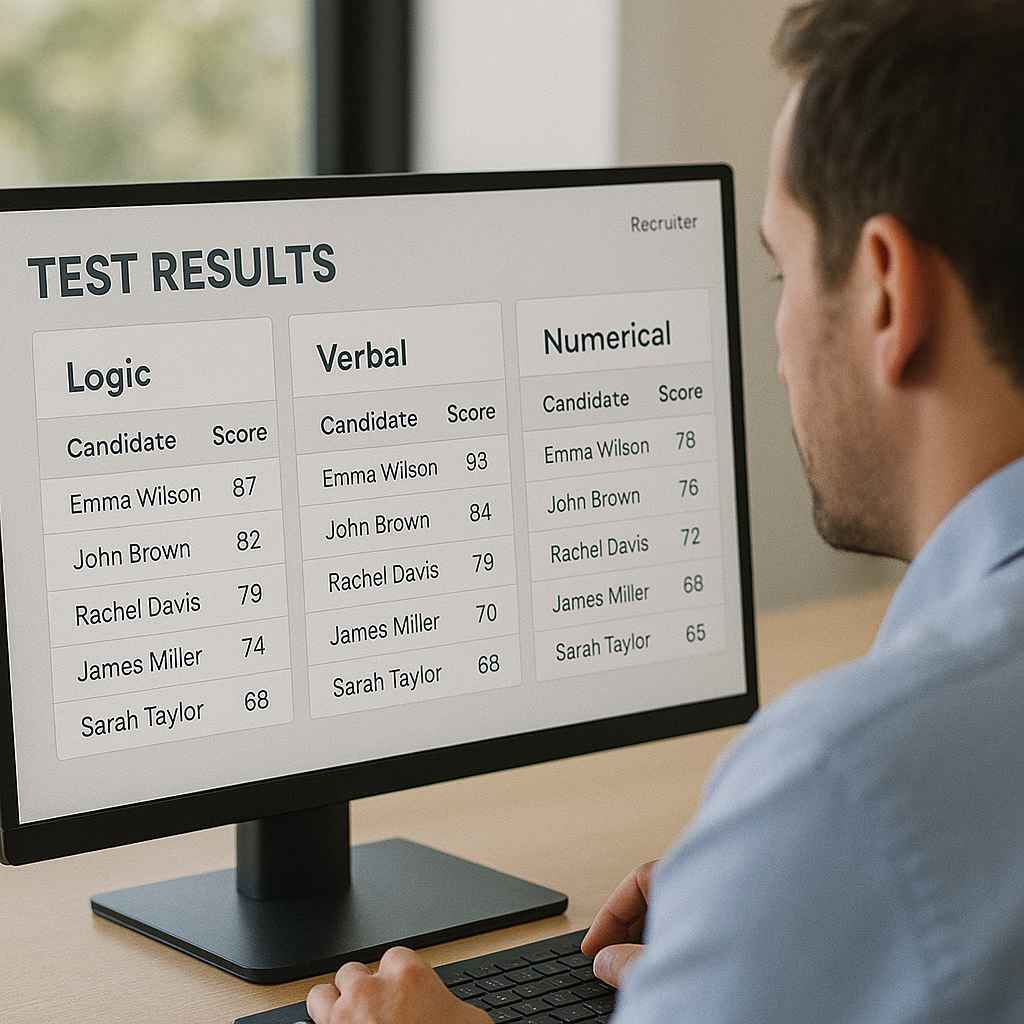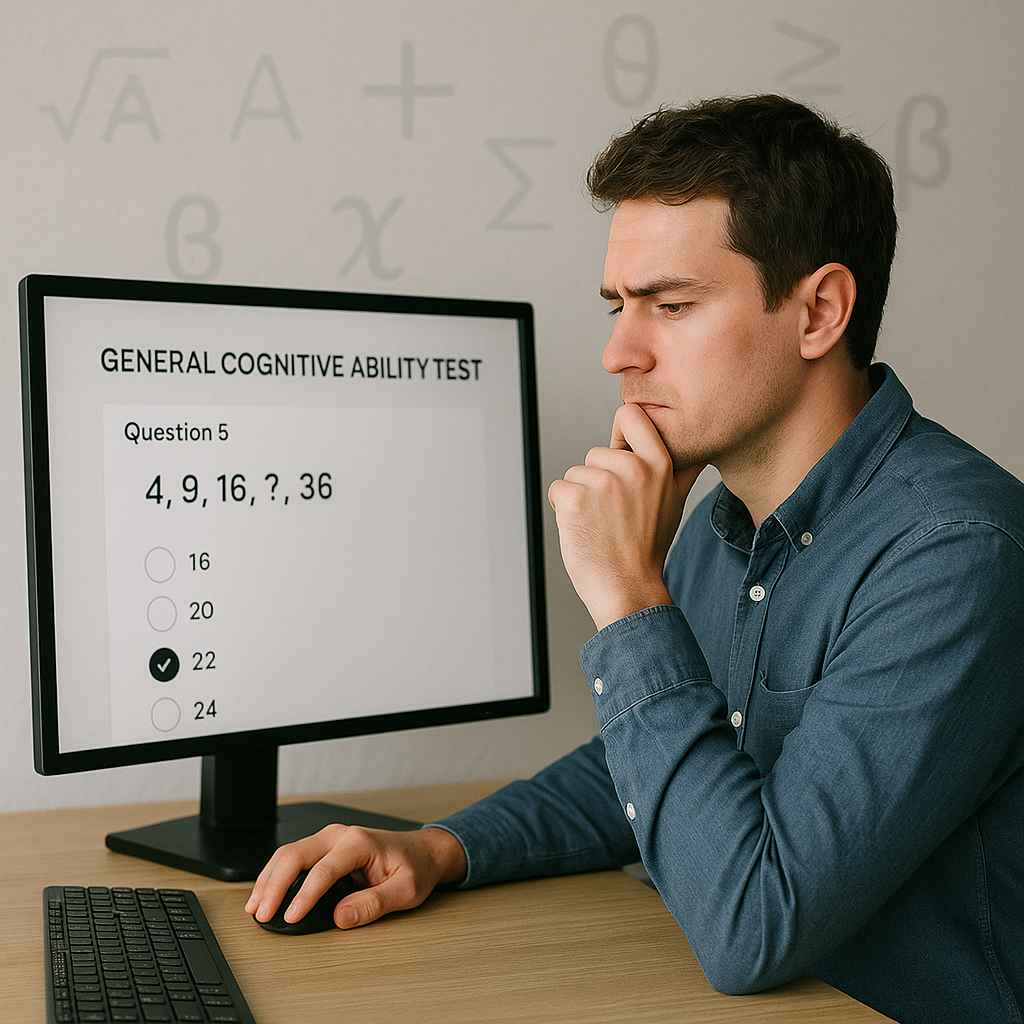Content
If you’ve ever looked at a resume and thought, “This person looks great on paper… but can they actually think critically and solve problems on the job?” — you’re not alone.
That’s exactly where cognitive assessments come in.
But instead of getting stuck in abstract definitions, let’s go straight to what you’re really looking for: real cognitive assessment examples, sample questions, formats, and how other recruiters are using them in hiring.
Whether you’re screening junior roles quickly or trying to spot high-potential future leaders, these examples will show you how cognitive testing works in practice—and how to use it well.
What Are Cognitive Assessments?

Cognitive assessments are structured tests used to measure how candidates think—how they learn, reason, solve problems, and understand complex information. They’re often part of a broader pre-employment testing strategy, especially in roles where mental agility and problem-solving are crucial.
To better understand the purpose and psychology behind these tests, check out the foundational guide on Cognitive Ability Tests for Employment.
But here, we’ll go deeper with actual examples and use cases so you can apply these insights directly to your hiring process.
Why Use Examples in the First Place?
You might be asking, “Why bother looking at sample questions?”
Here’s why cognitive assessment examples are valuable:
- They help you understand what’s being tested
- You can match question formats to job requirements
- You’ll gain insight into how these tests support faster, fairer hiring
- It’s easier to explain and justify the process to your team or leadership
Let’s explore the most common test types and formats, along with sample questions.
Sample Cognitive Assessment Questions by Type

We’ve broken down the most popular test categories so you can see how they work and when to use them.
🧠 General Cognitive Ability Test (GCA)
This test includes a mix of logic, memory, math, and reasoning problems to measure overall mental horsepower.
| Question Type | Example |
| Logical Reasoning | If some engineers are analysts and all analysts are thinkers, are all engineers thinkers? Options: A. Yes B. No C. Cannot determine |
This type is often used in pre-employment cognitive assessments where employers need to evaluate overall job readiness, especially for roles that require multitasking or decision-making under pressure.
🧩 Matrix Reasoning Test
Matrix reasoning tests evaluate abstract thinking and pattern recognition. Great for hiring developers, designers, and analytical thinkers.
| Question Type | Example |
| Pattern Recognition | Which image completes the matrix?[⬜ ⬛ ❓] Options: A. ⬛ B. ⬜ C. Both D. None |
This format appears frequently in short cognitive assessments where time is limited but complexity is high.
🔢 Numerical Reasoning Test
Designed to measure quantitative ability—interpreting numbers, graphs, or tables.
| Question Type | Example |
| Math Logic | A company’s revenue increased by 15% per month. If it was $10,000 in May, what is it in July? Options: A. $11,500 B. $13,225 C. $12,000 |
Numerical reasoning is ideal for finance, data, sales, or analyst roles. It’s often used in quick cognitive assessments during early-stage filtering.
📖 Verbal Reasoning Test
Tests the ability to understand and draw conclusions from written text.
| Question Type | Example |
| Comprehension | “Employees must submit reports by Friday or face penalties.”True or False: Submitting on Monday is acceptable. Answer: False |
You’ll find verbal reasoning in roles where communication, reading comprehension, and decision-making based on written rules are essential.
Common Test Formats You’ll Encounter
Test design matters. Some tests are short and fast-paced; others dig deeper into analytical thinking. Here’s how they vary:
| Test Format | Description | Best For |
| Multiple Choice | Most common. Timed or untimed. | General screening |
| True/False | Quick logic checks. | High-volume screening |
| Scenario-Based | Workplace simulations with written answers. | Leadership roles |
| Visual/Drag & Drop | Interactive pattern-solving. | Technical & design roles |
Each format can be tailored depending on the depth you need—something discussed frequently in education research, such as case studies applying Bloom’s Taxonomy to evaluate the complexity of test questions and their real-world application.
Use Cases: How Employers Use These Tests

Let’s walk through a few real-world examples of how businesses use cognitive assessment tools.
🔍 Use Case 1: Hiring for Customer Support
Problem: Dozens of applicants, but hard to tell who can actually think on their feet.
Solution: A short, timed cognitive test reveals fast processors and logical communicators. Often used as a screening test before the interview.
📈 Use Case 2: Promoting Internal Candidates
Problem: Who’s ready for a strategic leadership role?
Solution: Use cognitive behavioral assessments and general ability tests to see how well someone solves real-world challenges.
🌍 Use Case 3: Hiring Internationally or Remotely
Problem: Can’t meet in person, unsure about capability.
Solution: Online cognitive assessments with automated scoring and AI-based overviews give you a data-backed starting point—even across borders.
Choosing the Right Cognitive Assessment
When evaluating which test to use, consider the following factors:
| Decision Criteria | How to Choose |
| Job complexity | Use full cognitive ability tests for strategic roles |
| Speed & volume | Use short cognitive assessments to screen quickly |
| Skills required | Select between matrix, verbal, or numerical reasoning |
| Candidate level | Junior roles may need lighter versions, while execs need full tests |
Want help picking the right test? We offer Matrix Reasoning, Numerical Reasoning, and Verbal Reasoning tests designed for workplace relevance.
Related Topics You Should Explore Later
We’ve only scratched the surface. If you’re building a full hiring strategy, here are more in-depth resources to explore:
- What is Cognitive Assessment? Meaning, Uses, and Examples
- Top Cognitive Assessment Tools for Hiring Success
- Cognitive Assessment Tests for Employment: A Hiring Guide
- Understanding Cognitive Assessment Scores: What Do They Mean?
- Cognitive Behavioral Assessment: What It Is & How It’s Used
- Short Cognitive Assessments: Efficient Tools for Fast Screening
- How Much Do Cognitive Assessments Cost? A Practical Overview
- Top Cognitive Assessment Interview Questions to Ask Candidates
Let me know when you’re ready to add internal links to these cluster blogs.
Final Thoughts
Cognitive assessment examples don’t just show you the type of test—they show you the type of thinker you’re hiring.
Whether you’re testing for abstract logic, numerical fluency, or verbal clarity, the right examples help align hiring with job performance.
And the results? Better hires. Shorter time-to-fill. Less guesswork.
If you’re serious about objective hiring, faster screening, or just making more confident decisions, you can’t afford to skip cognitive testing.
👉 Book a demo to see how our tests work in action and how easily they fit into your hiring process.
